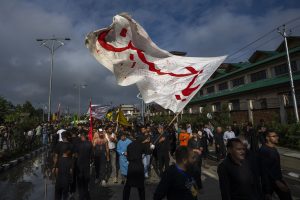Thousands of Shiite Muslims were allowed to hold a religious procession marking the Muslim month of Muharram in Indian-controlled Kashmir’s main city on Thursday for the first time since an anti-India rebellion broke out in the disputed region more than three decades ago.
The participants, mostly wearing black clothes, beat their chests and recited elegies in the commercial heart of Srinagar. Some carried copies of the Quran to protest recent public desecrations of the Islamic holy book in Sweden and Denmark.
Muharram is among the holiest months for Shiite Muslims and marks the martyrdom of the Prophet Muhammad’s grandson, Imam Hussein, and his 72 companions in the battle of Karbala in the seventh century in present-day Iraq. The mourning over their deaths reaches its peak on Ashura, the 10th day of Muharram. Thursday’s procession marked the eighth day on the calendar.
The main Muharram gatherings on the eighth and 10th days that used to pass through the city center were banned a year after an armed insurgency broke out in 1989 demanding the region’s independence from India or its merger with neighboring Pakistan, which also controls part of Kashmir. However, Muharram processions continued to be allowed elsewhere in the Indian-controlled portion.
Tens of thousands of civilians, rebels and government forces have been killed in the insurgency.
Scores of mourners tried to defy the ban in previous years, often leading to scuffles with police and the firing of tear gas.
Authorities said the lifting of the ban comes as the overall security situation has improved in the region in recent years.
Mohammad Aijaz, Srinagar’s civil administrator, said the procession was “a dividend of peace.”
The lifting of the ban came after a series of talks between Shiite leaders and government officials. Authorities imposed a series of conditions, including that participants should not use “anti-national slogans or propaganda” or “disrespect any national symbol.”
“It was after a long wait of almost 34 years that this procession has once again been allowed to go through its historical route,” said Shabib Ul Hassan, a young participant.
It was unclear whether the authorities would lift the ban on the 10th day procession as well.
Kashmiri Muslims have long complained that the Indian government restricts their religious freedom with the rationale of maintaining law and order, while promoting a massive annual Hindu pilgrimage to a holy cave, the Himalayan Amarnath Shrine in Kashmir.
The two-month Hindu pilgrimage, currently underway, draws hundreds of thousands of Hindu pilgrims from across India. The routes leading to the cave shrine are guarded by tens of thousands of soldiers.
Restrictions on Muslims have increased sharply since the Indian government led by Prime Minister Narendra Modi’s Hindu nationalist party scrapped the region’s semi-autonomy in 2019.
Since then, critics say the Indian government has tried to create what it calls “naya Kashmir,” or “new Kashmir,” by curbing dissent, civil liberties and media freedoms.
Authorities have also confined the region’s chief cleric and top separatist leader, Mirwaiz Umar Farooq, to his home and restricted large congregational prayers at the region’s main mosque.

































